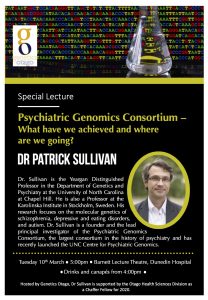Events
Upcoming events hosted by or involving Genetics Otago will be listed here. Please check back regularly for updates. A calendar of events that may be of interest to our members can be found at the bottom of this page and in the sidebar of other pages on this site, please note that this includes events hosted outside of Genetics Otago.
Logan Walker IPL
Preparing for the future of genetic health
Logan is a cancer geneticist and the current Associate Dean Research, at the University of Otago Christchurch. His research focuses on understanding the impact of genetic changes on health. After completing post-doctoral training in Australia, and returning to the University of Otago, his research programme was significantly strengthened by being awarded a Sir Charles Hercus Health Research Fellowship (Health Research Council) followed by a Rutherford Discovery Fellowship (Royal Society Te Apārangi).
He is an invited member of several international groups tasked with improving protocols for genetic testing around the world. This work includes developing RNA diagnostic guidelines for both the clinical and research setting, and providing expert advice about the implementation of these guidelines and the interpretation of genetic test results. In collaboration with multiple international consortia, he has also contributed to and led some of the largest genetic association studies to discover inherited DNA copy number changes that increase or decrease susceptibility to cancer.s.
Date: Tuessday, 11th March 2025
Time: 5:30 pm – 7:00 pm
Venue: Rolleston Lecture Theatre, Christchurch Campus (and via Zoom)
AlphaFold for Geneticists
The AlphaFold for Geneticists workshop will introduce participants to the AI tool AlphaFold. Attendees will learn how to run AlphaFold on their chosen variant and interpret outputted results. Led by experts Prof Peter Mace and Dr Adam Middleton, the session will provide insight into the strengths and limitations of AlphaFold. Further details will be provided to registrants.
Date: Monday, 24th March 2025
Time: 9:00 am – 12:00 pm
Venue: TBC, Dunedin Campus
This workshop is now full, please email go@otago.ac.nz if you would like to be added to the waitlist.
Calendar of Events
The below is a calendar of events hosted by GO as well as events hosted by others that may be of interest to our members. If you have an event you would like us to include please contact us here.
Psychiatric Genomics Consortium – What have we achieved and where are we going?
Dr Patrick Sullivan
Dr. Sullivan is the Yeargan Distinguished Professor in the Department of Genetics and Psychiatry at the University of North Carolina at Chapel Hill. He is also a Professor at the Karolinska Institute in Stockholm, Sweden. His research focuses on the molecular genetics of schizophrenia, depressive and eating disorders, and autism. Dr. Sullivan is a founder and the lead principal investigator of the Psychiatric Genomics Consortium, the largest consortium in the history of psychiatry and has recently launched the UNC Centre for Psychiatric Genomics.
Lecture begins at 5pm, preceded by drinks and canapes from 4pm.
Changes in our individual book of life – our DNA – can alter who we are and cause disease. Identifying and understanding changes in our DNA, and how they lead to conditions affecting brain development, is of immense importance.
In this talk, Professor of Paediatric Genetics Stephen Robertson, and Dr Adam O’Neill, Research Fellow, both of the University of Otago Department of Women’s and Children’s Health, address how this is being achieved, and outline the future applications of this work.
5.30pm, Tuesday 10 March
Hutton Theatre
Free admission
https://otagomuseum.nz/whats-on/do/programme-and-events/event/genetics-and-the-developing-brain
Associate Professor Elin Gray
Edith Cowan University, Perth
Title TBC.
This special seminar is being held in conjunction with the EUG Symposium to be held on the 13th March.
This event is open to all GO members.
Hosted by Genetics Otago, the 2nd EUG (Epigenetics User Group) Symposium is to be held on 13th March 2020 at the Hutton Theatre in Otago Museum. The Symposium will be preceded by a day of workshops on the 12th of March 2020.
The aim of the Symposium is to bring Epigenetics research and collaboration opportunities to all researchers from students through to principal investigators and as such the Symposium and associated workshops will be free of charge to all delegates.
Key Dates
Abstract Submission Deadline: 17th January 2020
Authors Advised: TBC
Registration Closes: 27th February 2020
More information here
Dr Felicity Newell
QIMR Berghofer Medical Research Institute, Brisbane
“The genomics of melanoma subtypes”
This special seminar is being held in conjunction with the EUG Symposium to be held on the 13th March.
Please refer to the below pdf for details of speakers each week.
Dr Brad Hurren (Department of Anatomy) “What is the ASERT group all about?” and Mr Tapekaoterangi Hakopa (Department of Anatomy) “Te Mātauranga Māori o te tinana – understanding the human body in te reo Māori/with a Māori world view.”
Professor Graham Wallis
Department of Zoology, University of Otago
Going under down under?
Molecular data provide no evidence for complete inundation of New Zealand during the Oligocene Marine Transgression.
The last 25 years have seen heated debate over whether there was continuous emergent land through the Oligocene “drowning” of current-day NZ some 25–23 million years ago. Such an event would imply that all terrestrial, freshwater and maybe coastal marine lineages must have dispersed here since. A compilation of 248 phylogeographic splits (i.e. molecular estimates of divergence times between NZ lineages and their closest overseas sister groups) follows a smooth exponential over the last 50 Ma or more. ~74 of these lineages appear to have survived the OMT in situ; some of these major lineages comprise multiple additional lineages as a result of autochthonous speciation prior to the OMT. Although extinction of closer
overseas lineages will cause overestimation of some splits, there is no evidence for a deficit of pre-Oligocene lineages, nor an excess of ones arriving just afterwards. Consequently, this large body of molecular data provides no evidence for complete inundation of NZ during the Oligocene.
Please refer to the below pdf for details of speakers each week.


